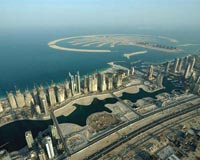 A world city fighting to compete with its rivals. An investment hotspot, wary of over- or under-regulating. And a destination that is increasingly attracting the world to its door. Dubai has a lot in common with London.
A world city fighting to compete with its rivals. An investment hotspot, wary of over- or under-regulating. And a destination that is increasingly attracting the world to its door. Dubai has a lot in common with London.
It’s a slightly fatuous comparison, of course. There is a world of difference between the emirate and the capital. But what a whistle-stop tour of Dubai and Abu Dhabi revealed this week was not just that are there already parallels, but if these emirates and other world cities raised their game, they would pose a serious challenge to London.
Dubai is chastened by the financial crisis (a very good thing) but its confidence is undimmed. GDP growth reached 4.6% last year. The latest HSBC purchasing manager’s index showed activity close to a record high. In August, Forbes magazine rated Dubai as the seventh most influential city in the world – and the only city from the developing world to crack the top 20. And how’s this for a stat: not only is Dubai likely to usurp Heathrow as the world’s busiest airport within a matter of months, by 2030 it expects to treble air passenger numbers to 200m.
Dubai isn’t the only emirate attracting covetous glances. Abu Dhabi is more soberly planned than its neighbour, yields are attractive for investors, high-end residential is beginning to make its mark and culture, retail and leisure are combining to create a diverse destination.
And its ties with the UK run deep. In 2008, Sheikh Mansour, the deputy prime minister of the UAE, bought Manchester City FC. Earlier this year, EG revealed a £1bn regeneration of east Manchester is being planned by the Sheikh’s private equity group, Abu Dhabi United. Don’t bet against further activity.
And while a development of Manchester flats was being showcased in Dubai this week, expect Abu Dhabi to be added to future roadshows of stock in the North West. That would further bolster the region’s reputation.
More than that, many in the UAE expect the region to do more to attract high-net-worth individuals. Some believe a focus on financial services will draw in more occupiers. And is there anywhere on the planet with such attention to retail?
Panellists at this week’s Global Real Estate Debate, staged with Cluttons in Dubai, threw their weight behind the idea that the UAE could one day become the business capital of the world. Many will disagree that that could ever be possible. But with many strong fundamentals, staggering ambition and incremental change, it is moving closer all the time.
Thanks to those who donated to the Estates Gazette/LandAid tweetathon this week. It’s not too late to do so. It’s simple: make a pledge and include a message and we’ll retweet it. Last year’s tweetathon (an awful word, I know) was a great success. Do support this year’s by going to www.justgiving.com/estatesgazette
An Irish parliamentary finance committee hearing heard this week that staff have been leaving the country’s bad bank in droves. Since its inception in 2009, 108 staff have left Nama, with half going to work in property consultancy or legal firms.
MPs, or rather TDs, on the committee, wanted assurance that private firms would not benefit from the accumulated knowledge of the ex-Nama staff. Chief executive Brendan McDonagh told the committee it was illegal to part with information garnered during employment, and that many departed staff were still subject to the Official Secrets Act.
That may true. But any notion – whether real or perceived – that the property sector has capitalised on Nama information will be rigorously monitored by TDs and the Irish press.
It will be a real test for Chinese walls in the Irish property industry, and one that the rest of the industry would do well to watch.










